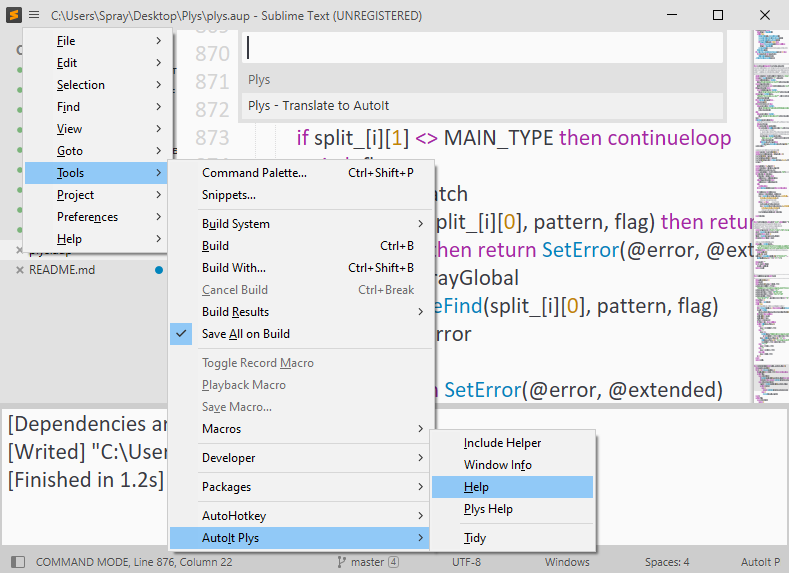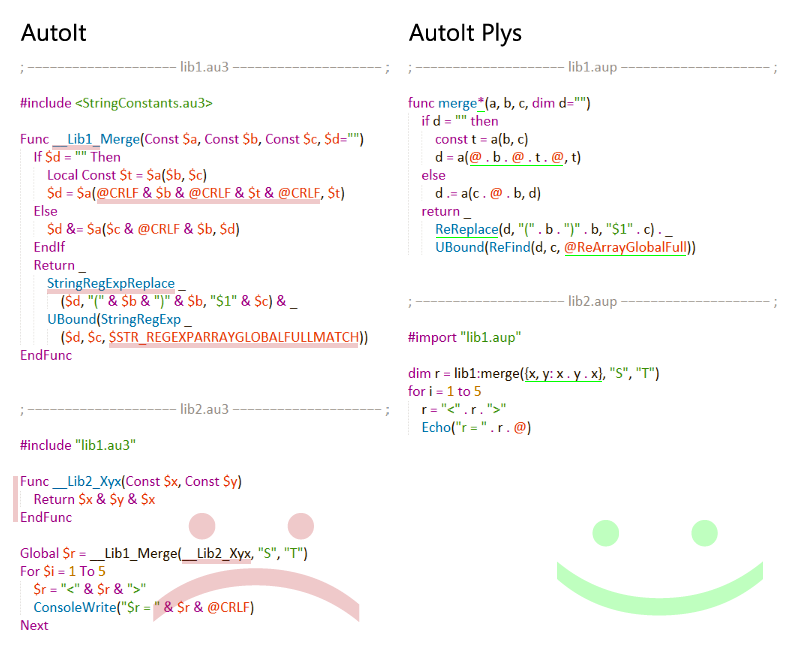Search the Community
Showing results for tags 'lambda'.
-
Plys (/ˈplaɪz/) represents the inconspicuous wrapper which complements the AutoIt language with preprocessor keyword #import "filename" loads only public functions and variables Python-like code blocks by lines indentation (without endfunc, wend etc.) dim and const outside of functions means global and global const respectively, inside of functions means local and local const arguments of function are const by default, but with dim prefix it becomes variable short synonyms for functions as a rule using in large projects: for arrays, files and strings no “$” prefix in variable names single-line anonymous functions and each of this is optional Overview ; file “mylib.aup” dim foo*, bar func baz*() foo = quux() func quux(dim arg="one/two/three") bar = Sort(Split(arg, "/", @NoCount)) return "begin" . @ . bar[0] . @ . "end" ; file “main.aup” #import "mylib.aup" … In this example variable bar and function quux() are private for module mylib.aup (names at declaration ends with an asterisk) and not visible in main.aup. Variable foo and function baz() will be visible with the “mylib:” prefix: ; file “main.aup” #import "mylib.aup" foo = baz() ; error: no foo and baz() in this scope mylib:foo = mylib:baz() ; OK: foo and baz() are public in “mylib” scope mylib:bar = mylib:quux() ; error: bar and quux() are private in “mylib” scope Sort is synonym for _ArraySort, Split is synonym for StringSplit, @NoCount is synonym for $STR_NOCOUNT, “@” is synonym for @CRLF, “.” is synonym for “&” operator. All synonyms Setup Requirements: AutoIt (minimum), AutoIt Script Editor (optionally). Download and unpack archive from latest release. Double click the “setup.aup.au3” file and follow to setup instructions. First steps Right-click in the any folder and select New > AutoIt Plys Script. Right-click on the created file again and select Edit Script. At the bottom of the file type the following: #include <MsgBoxConstants.au3> dim msg = "" for i = 1 to 10 msg .= "Hello World!" . @ msg = TrimRight(msg, 1) MsgBox(MB_OK, "My First Plys Script", msg) Save the script and double-click the file for run (or right-click the file and select Run Script). Extra options You can use extra options by typing in the script one of this: #plys dollarprefix ; refuse to use variables without “$” prefix #plys noconst ; use default variable declarations behavior #plys noindent ; ignore indentation but obligue to use “endif/wend/etc”. #plys noimport ; refuse the import operator #plys nosynonyms ; refuse the function and macro synonyms #plys nolambda ; refuse the anonymous functions Environment After installation Plys already integrated to Windows shell. If you want to run a script by command line use <AutoIt3.exe path> <AutoIt3exe folder>\Plys\plys.aup.au3 [/Rapid] [/ErrorStdOut] [/NoStdio] <script path> [<arguments>] /Rapid means that if source files have not be modified since the previous run, they will not be re-translated. This option speeds up script execution startup. The /ErrorStdOut switch allows the redirection of a fatal error to StdOut which can then be captured by an application. Also you can turn off data exchange through standard input/output streams, then the shell process will not hang in memory, but then you will not be able to observe the output of your program in the output window of your development environment. You can do this by adding the /NoStdio option. If you want to translate a script to pure AutoIt code use <AutoIt3.exe path> <AutoIt3exe folder>\Plys\plys.aup.au3 [/Translate] <script path> Try AutoIt Plys package for Sublime Text which including syntax highlighting, auto-completions, build systems for run and compile, context help, “goto” feature, comments toggling, Tidy and Include Helper command for AutoIt and AutoIt Plys. You can compile the script, specifying to the compiler the translated file *.aup.au3. How it works The plys.aup.au3 file contains the code that will run immediately after the launch of your script. On setup this file will copy to AutoIt install dir (as Plys\plys.aup.au3) and aup-files will associated with it. On the launch aup-files are automatically processed, after which the new AutoIt process interprets the already converted code, and the current process remains cycle to continue data exchange with the new process via standard streams. This handler replaces all #import with #include. The processed files get the extension .aup.au3 and are placed in the folder of the original script with “hidden” attribute. Future #import "filename.aup" noprefix #import "mylib.aup" noprefix bar = foo() ; bar and foo will be taken from the “mylib.aup” without “mylib:” prefix #import "filename.aup" as alias #import "mylib.aup" as ml ml:bar = ml:foo() ; bar and foo will be taken from the “mylib.aup” function scope functions func GlobalFunc() dim var1 = "body" func LocalFunc(var2) return "begin" . @ . var2 . @ . "end" return LocalFunc(LocalFunc(var1)) MsgBox(MB_OK, "begin/body/end", GlobalFunc()) array values in place and array comprehension a = [3, 7, 1] for i in [1, 2, 4] Echo(i . @) Display([t*3 for t in a if t > i]) ; if i = 2 then Display([9, 21]) etc. Download Repository on GitHub Very old version (import only): import
- 6 replies
-
- lambda
- modularity
-
(and 2 more)
Tagged with:
-
If you are coming from the realm of C# 3.0 then lamda expressions should be pretty familiar to you as it's basic syntactic sugar for creating a function with a conditional return. Since functions in AutoIt are first class objects, the following code should make some sense. It passes an array of integers to a function called IsTrueForAll() that checks whether the function object matches the return condition of that function (you passed). So for example a function called IsGreaterThanOrEqualTo10() checks if all values are greater than or equal to 10 (TRUE). Similarly, IsLessThan10() checks if all values are less than 10 (FALSE). This example should be nothing new to those of you who use v3.3.10.0+ and have an understanding of Call(). #include <MsgBoxConstants.au3> Local $aArray[] = [10, 100, 99, 67] If IsTrueForAll($aArray, IsGreaterThanOrEqualTo10) Then MsgBox($MB_SYSTEMMODAL, '', 'Condition was True.') Else MsgBox($MB_SYSTEMMODAL, '', 'Condition was False') EndIf If IsTrueForAll($aArray, IsLessThan10) Then MsgBox($MB_SYSTEMMODAL, '', 'Condition was True.') Else MsgBox($MB_SYSTEMMODAL, '', 'Condition was False') EndIf Func IsTrueForAll($aArray, $hFunc) ; Loop through the array and check the function passed with a single param matches the condition. For $i = 0 To UBound($aArray) - 1 If Not $hFunc($aArray[$i]) Then Return False EndIf Next Return True EndFunc ;==>IsTrueForAll Func IsGreaterThanOrEqualTo10($x) Return $x >= 10 EndFunc ;==>IsGreaterThanOrEqualTo10 Func IsLessThan10($x) Return $x < 10 EndFunc ;==>IsLessThan10 But, we could easily just forget about writing the functions (less typing is always nice) and let the compiler or pre-processor do all the work for us. It would simply use the lambda expression and create the function for us with whatever we specified. Like so... #include <MsgBoxConstants.au3> Local $aArray[] = [10, 100, 99, 67] If IsTrueForAll($aArray, $x => $x >= 10) Then ; $x is the parameter, => tells us it's a lambda expression and then the condition we are checking. MsgBox($MB_SYSTEMMODAL, '', 'Condition was True.') Else MsgBox($MB_SYSTEMMODAL, '', 'Condition was False') EndIf If IsTrueForAll($aArray, $x => $x < 10) Then ; $x is the parameter, => tells us it's a lambda expression and then the condition we are checking. MsgBox($MB_SYSTEMMODAL, '', 'Condition was True.') Else MsgBox($MB_SYSTEMMODAL, '', 'Condition was False') EndIf Func IsTrueForAll($aArray, $hFunc) ; Loop through the array and check the function passed with a single param matches the condition. For $i = 0 To UBound($aArray) - 1 If Not $hFunc($aArray[$i]) Then Return False EndIf Next Return True EndFunc ;==>IsTrueForAll...which would create the following code with anonymous functions (they're anonymous as we don't care about them in our main script)... #include <MsgBoxConstants.au3> Local $aArray[] = [10, 100, 99, 67] If IsTrueForAll($aArray, D3F7B1B92177415CA70C7FFC35C2649C) Then MsgBox($MB_SYSTEMMODAL, '', 'Condition was True.') Else MsgBox($MB_SYSTEMMODAL, '', 'Condition was False') EndIf If IsTrueForAll($aArray, DA06B548ABF4045AA32F805E6651004) Then MsgBox($MB_SYSTEMMODAL, '', 'Condition was True.') Else MsgBox($MB_SYSTEMMODAL, '', 'Condition was False') EndIf Func IsTrueForAll($aArray, $hFunc) For $i = 0 To UBound($aArray) - 1 If Not $hFunc($aArray[$i]) Then Return False EndIf Next Return True EndFunc ;==>IsTrueForAll Func D3F7B1B92177415CA70C7FFC35C2649C($x) Return $x >= 10 EndFunc ;==>D3F7B1B92177415CA70C7FFC35C2649C Func DA06B548ABF4045AA32F805E6651004($x) Return $x < 10 EndFunc ;==>DA06B548ABF4045AA32F805E6651004 Example of parsing a lambda expression and replacing in the chosen script: #include <WinAPICom.au3> ; Script read from a file. Local $sScript = "#include <MsgBoxConstants.au3>" & @CRLF $sScript &= "" & @CRLF $sScript &= "Local $aArray[] = [10, 100, 99, 67]" & @CRLF $sScript &= "If IsTrueForAll($aArray, $x => $x >= 10) Then" & @CRLF ; Lambda expression. $sScript &= " MsgBox($MB_SYSTEMMODAL, '', 'Condition was True.')" & @CRLF $sScript &= "Else" & @CRLF $sScript &= " MsgBox($MB_SYSTEMMODAL, '', 'Condition was False')" & @CRLF $sScript &= "EndIf" & @CRLF $sScript &= "" & @CRLF $sScript &= "If IsTrueForAll($aArray, $x => $x < 10) Then" & @CRLF ; Lambda expression. $sScript &= " MsgBox($MB_SYSTEMMODAL, '', 'Condition was True.')" & @CRLF $sScript &= "Else" & @CRLF $sScript &= " MsgBox($MB_SYSTEMMODAL, '', 'Condition was False')" & @CRLF $sScript &= "EndIf" & @CRLF $sScript &= "" & @CRLF $sScript &= "Func IsTrueForAll($aArray, $hFunc) ; Loop through the array and check the function passed with a single param matches the condition." & @CRLF $sScript &= " For $i = 0 To UBound($aArray) - 1" & @CRLF $sScript &= " If Not $hFunc($aArray[$i]) Then" & @CRLF $sScript &= " Return False" & @CRLF $sScript &= " EndIf" & @CRLF $sScript &= " Next" & @CRLF $sScript &= " Return True" & @CRLF $sScript &= "EndFunc ;==>IsTrueForAll" & @CRLF ReplaceLambdaInScript($sScript, '$x => $x >= 10') ; Parse the lambda expression and replace it in the above script. ReplaceLambdaInScript($sScript, '$x => $x < 10') ; Parse the lambda expression and replace it in the above script. ConsoleWrite($sScript & @CRLF) ; This is the new script with the lamda expression convert to an anonymous method! ClipPut($sScript) Func CreateLambdaMethod($sExpression) ; Currently no error checking of whether parameters match. Local $bIsReturn = False, _ ; Is the return condition. $sFunction = StringRegExpReplace(_WinAPI_CreateGUID(), '[}{-]', ''), $sParam = '', $sReturn = '' $sFunction = StringRegExpReplace($sFunction, '^\d+', '') ; Remove digits at the beginning of the function name. For $i = 1 To StringLen($sExpression) $sChr = StringMid($sExpression, $i, 1) If $bIsReturn Then $sReturn &= $sChr ElseIf $sChr & StringMid($sExpression, $i + 1, 1) == '=>' Then ; Check for => $i += 1 $bIsReturn = True ElseIf Not $bIsReturn Then $sParam &= $sChr EndIf Next If Not $bIsReturn Then Return "" ; Something went wrong as the => was not found. $sParam = '(' & StringRegExpReplace($sParam, '^\h*|\h*$', '') & ')' $sReturn = @TAB & 'Return ' & $sReturn Return 'Func ' & $sFunction & $sParam & @CRLF & $sReturn & @CRLF & 'EndFunc ;==>' & $sFunction & @CRLF EndFunc ;==>CreateLambdaMethod Func ReplaceLambdaInScript(ByRef $sScript, $sLambda) Local $sFunction = CreateLambdaMethod($sLambda) Local $sFunctionName = StringRegExp($sFunction, 'Func (\w*)\(', 3) If @error Then Return False $sFunctionName = $sFunctionName[0] $sScript = StringReplace($sScript, $sLambda, $sFunctionName, 1) $sScript &= @CRLF & $sFunction Return True EndFunc ;==>ReplaceLambdaInScriptIt was a simple idea I had this morning whilst having breakfast.





